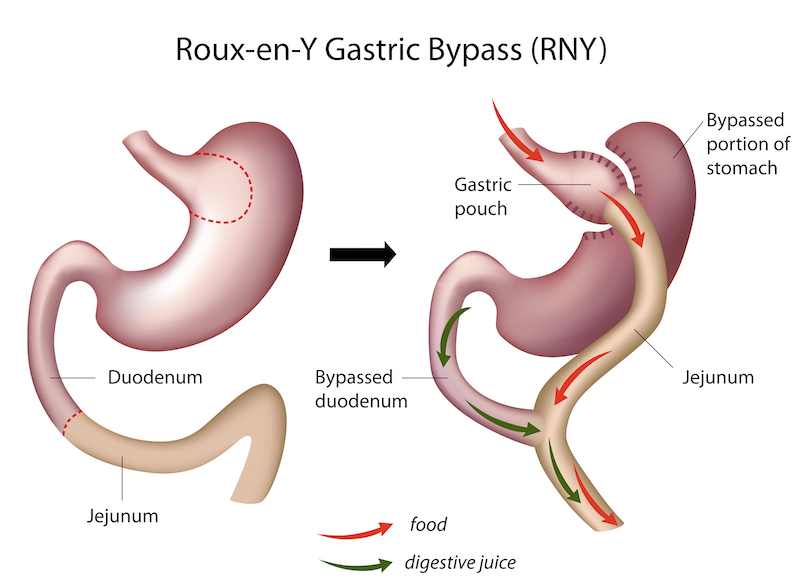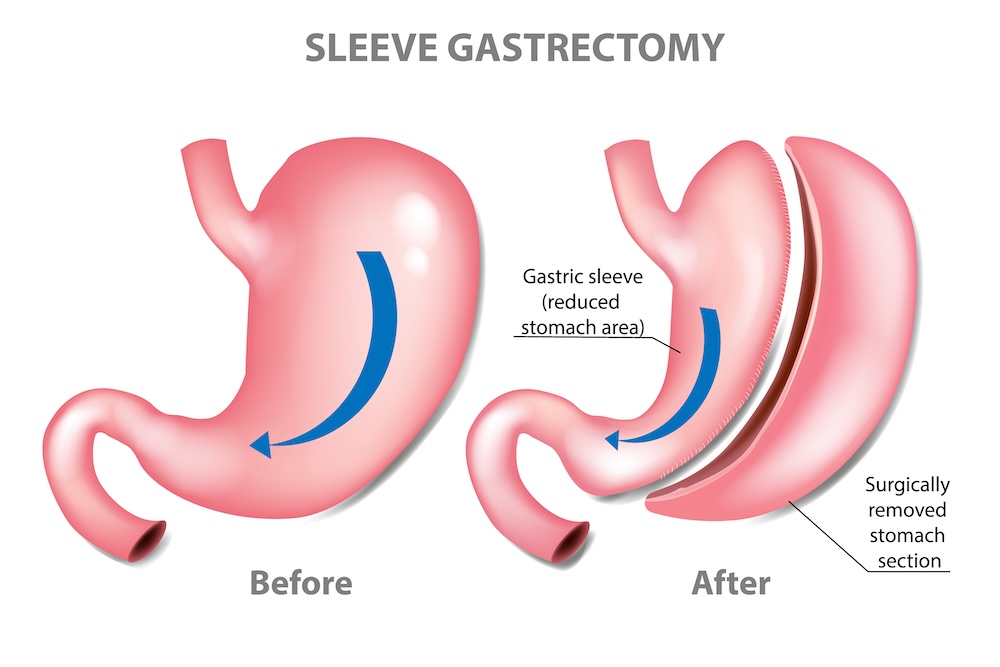PROCEDURES
Roux-en-y Gastric Bypass
Vertical Sleeve Gastrectomy
weight loss solutions
Bariatric surgery
Partnering with you to find the best weight loss solution for your journey. Offering minimally invasive and robotically assisted procedures as well as medical weight loss injections to best fit your body type and health goals.
Learn More →
Bariatric Surgery in Nashville
Every procedure we offer can shorten the time required to digest food or reduce the size of the stomach itself. Your weight loss surgeon will partner with you to determine which approach will work best for you. They will help you consider whether open bariatric surgery or minimally invasive robotic bariatric surgery will be the best fit for you.
We are all different, Dr. Davis at Nashville Bariatrics™ understands that your weight loss journey will be unique to you. Rest assured that we will customize your bariatric care to fit your specific physical, medical, mental, and emotional needs.
Bariatric procedures we offer
→ Gastric Bypass Surgery
→ Sleeve Gastrectomy
→ Bariatric Revision Surgery
Roux-en-y Gastric Bypass
Vertical Sleeve Gastrectomy
RNY Gastric Bypass
Gastric bypass surgery, also known as Roux-en-Y gastric bypass (RYGB), is a weight loss surgery designed to help people with severe obesity improve or resolve associated health conditions, like type-2 diabetes and high blood pressure. Gastric bypass surgery achieves weight loss through both restriction (reducing the amount of food that can be eaten at one time) and malabsorption (decreasing the absorption of calories and nutrients from food).

Gastric Bypass in Nashville
Pros →
- Significant Weight Loss
- Effective Food Restriction
- Reducing Absorption of Calories
- Minimally Invasive Laparoscopic Surgery
- Improving Obesity-Related Conditions
CONS →
- Surgical Risks
- Nutritional Deficiencies
- Dumping Syndrome
- Possible Long-Term Complications
- Commitment to Lifestyle Changes
First, the surgeon creates a small pouch at the top of the stomach using staples or a plastic band. This pouch is about the size of a walnut and can only hold a small amount of food. As a result, patients feel full more quickly, leading to reduced calorie intake.
Next, the surgeon divides the small intestine into two sections and attaches the lower part of the small intestine directly to the small stomach pouch. Food will then bypass the rest of the stomach and the upper portion of the small intestine, where most of the calories and nutrients from food are absorbed. As a result, some food leaves the body as waste. By bypassing this part of the digestive tract, the body absorbs fewer calories and nutrients from food, aiding in weight loss.
At Nashville Bariatrics, all of our gastric bypass surgeries are either laparoscopic or robotic. Laparoscopic surgery is minimally invasive because it uses a few small incisions to reach the stomach and small intestine, as opposed to one large incision. This procedure can be done robotically, with the surgeon in an operating room controlling robotic arms that hold the surgical instruments. We prioritize patient health and comfort, so our team of surgeons learns and masters the latest technology to provide the best outcomes possible for weight loss surgery.
Vertical Sleeve Gastrectomy
A sleeve gastrectomy is a surgical weight-loss procedure that removes a large portion of the stomach, leaving behind a smaller, sleeve-shaped stomach. This surgery removes around 80% of the stomach and does not affect the small bowel. This reduction in stomach size restricts the amount of food one can consume—usually only a few tablespoons—resulting in feeling full with smaller meals.
Additionally, the part of the removed stomach produces hormones that stimulate hunger, so removal often reduces appetite. Sleeve gastrectomy is considered a relatively safe and effective option for individuals struggling with obesity and related health issues.
THE PROCEDURE →
The surgeon makes small incisions in the upper belly and inserts a tube with a tiny camera into one of the small incisions. The camera sends video to a screen for the surgeon to see the organs. The surgeon inserts the small surgery tools into the other small incisions. To perform the surgery, the surgeon looks at the screen to maneuver the tools. This method is called laparoscopic surgery, and almost all sleeve gastrectomy surgery is now done this way because it is minimally invasive and requires less recovery time. During the sleeve gastrectomy, the surgeon cuts the stomach lengthwise (up and down) with a tool that staples as it cuts. They then remove the larger part of the stomach. The side of the remaining stomach (the sleeve) is closed off with staples made from stainless steel or titanium.
Vertical sleeve gastrectomy
PROS →
- Significant Weight Loss
- Reduced Hunger
- Digestive Tract Preservation
- Minimally Invasive Laparoscopic Surgery
- Improving Obesity-Related Conditions
CONS →
- Surgical Risks/Long-Term Complications
- Non-Reversible
- Dumping Syndrome
- Commitment to Lifestyle Changes
- Cost

What Is →
BARIATRIC REVISION SURGERY?
Bariatric revision surgery is a surgical procedure performed to modify or correct a previous weight loss surgery that has either failed to produce the desired weight loss or has led to complications. Revisional surgery is a complex procedure that requires careful evaluation and planning by a multidisciplinary team, including bariatric surgeons, nutritionists, and psychologists. A patient should decide to undergo revisional surgery after thorough discussions with healthcare providers, weighing the potential risks and benefits. Additionally, patients may need to undergo preoperative evaluations to assess their current health status and determine the most appropriate course of action.
MINIMALLY INVASIVE WEIGHT LOSS SURGERY
At Nashville Bariatrics, all of our bariatric revision surgeries are either laparoscopic or robotic. Laparoscopic surgery is minimally invasive because it uses a few small incisions to reach the stomach and small intestine, as opposed to one large incision. This procedure can be done robotically, with the surgeon in an operating room controlling robotic arms that hold the surgical instruments. We prioritize patient health and comfort, so our team of surgeons learns and masters the latest technology to provide the best outcomes possible.
TYPES OF BARIATRIC REVISION SURGERY:
Conversion to Another Bariatric Procedure, Gastric Band Removal, Gastric Band Adjustment, Gastric Bypass Revision, Sleeve Gastrectomy Revision.
REASONS FOR BARIATRIC REVISION SURGERY:
Inadequate Weight Loss, Complications, Disease Progression, Changes in Anatomy, Patient Preference.

What to expect →
After bariatric surgery
After bariatric surgery, success is in your hands.
The changes you make need to be lifelong commitments. Follow all instructions on nutrition and activity. Be aware that how you see yourself and how others see you may change. Turn to those close to you for support. They can help you adjust to your new life.
FAQ →
qualifications for weight loss surgery
QUALIFYING FOR MINIMALLY INVASIVE BARIATRIC SURGERY
Bariatric surgery is not for everyone.
To qualify →
You must have a BMI of 40 or more or a BMI of 35 or more (see BMI info), plus a serious obesity-related health problem, such as type 2 diabetes, high blood pressure, or sleep apnea. You must be healthy enough to undergo surgery. You may be required to have a psychological evaluation. You must have tried to lose weight by other means, such as diet and exercise.
WHAT TO EXPECT AS YOU LOSE WEIGHT
Most likely, you’ll lose weight steadily for the first 6 to 12 months after surgery. The most rapid weight loss often happens during the first six months after surgery. By the first year and a half, most people lose over half their excess weight. After that, you may gain a small amount of weight back, which is normal. Set realistic and meaningful goals for weight loss. Most likely, you won’t reach your ideal weight through surgery alone, but you will reach a healthier weight.
SETTING REALISTIC EXPECTATIONS
The goal of bariatric surgery is to help you lose over half of your excess weight, which can improve or prevent health problems. This surgery is not done only for cosmetic reasons. Keep in mind that: You should try other weight-loss methods first, like lifestyle changes, behavioral modifications, and prescription medicines. Surgery is only a choice if other methods don’t work. Surgery is permanent. You will need to change how you eat for the rest of your life. You must commit to eating less and being more active after surgery. If you don’t, you will not lose or keep off the weight long-term.
It will take time to reach a healthy weight. Most weight is lost steadily during the first year or two after surgery. Most likely, you will only lose some of your excess weight. But you can reach a much healthier weight and maintain it by following your healthcare provider’s advice for diet and exercise.

Bariatrics Clinic
615.425.0550
393 Wallace Rd Ste 301, Bldg A
Nashville, TN 37211
M-F 7:30 am - 4:30 pm


